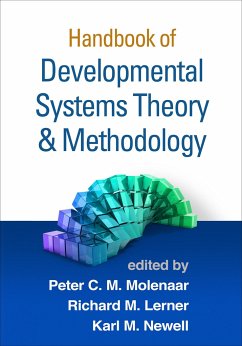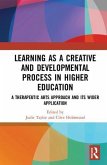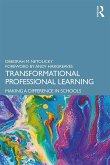Handbook of Developmental Systems Theory and Methodology
Herausgeber: Molenaar, Peter C M; Newell, Karl M; Lerner, Richard M
Handbook of Developmental Systems Theory and Methodology
Herausgeber: Molenaar, Peter C M; Newell, Karl M; Lerner, Richard M
- Gebundenes Buch
- Merkliste
- Auf die Merkliste
- Bewerten Bewerten
- Teilen
- Produkt teilen
- Produkterinnerung
- Produkterinnerung
Developmental systems theory provides powerful tools for predicting complex, dynamic interactions among biological and environmental processes in human behavior and health. This groundbreaking handbook provides a roadmap for integrating key concepts of developmental systems theory (such as self-organization, reciprocal dynamic interaction, and probabilistic epigenesis) and simulation models (connectionist and agent-based models) with advanced dynamic modeling approaches for testing these theories and models. Internationally renowned developmental science scholars present innovations in…mehr
Andere Kunden interessierten sich auch für
![Empowerment Evaluation Principles in Practice Empowerment Evaluation Principles in Practice]() David M. Fetterman / Abraham Wandersman (eds.)Empowerment Evaluation Principles in Practice101,99 €
David M. Fetterman / Abraham Wandersman (eds.)Empowerment Evaluation Principles in Practice101,99 €![Handbook of Diversity Issues in Health Psychology Handbook of Diversity Issues in Health Psychology]() Pamela M. Kato / Traci Mann (Hgg.)Handbook of Diversity Issues in Health Psychology121,99 €
Pamela M. Kato / Traci Mann (Hgg.)Handbook of Diversity Issues in Health Psychology121,99 €![Farewell to Variables Farewell to Variables]() Farewell to Variables59,99 €
Farewell to Variables59,99 €![Learning as a Creative and Developmental Process in Higher Education Learning as a Creative and Developmental Process in Higher Education]() Learning as a Creative and Developmental Process in Higher Education198,99 €
Learning as a Creative and Developmental Process in Higher Education198,99 €![Methodology in Neuropsychological Assessment Methodology in Neuropsychological Assessment]() Sara MondiniMethodology in Neuropsychological Assessment111,99 €
Sara MondiniMethodology in Neuropsychological Assessment111,99 €![University-Industry Collaboration and the Success Mechanism of Collaboration University-Industry Collaboration and the Success Mechanism of Collaboration]() Nian ZhiyingUniversity-Industry Collaboration and the Success Mechanism of Collaboration95,99 €
Nian ZhiyingUniversity-Industry Collaboration and the Success Mechanism of Collaboration95,99 €![Transformational Professional Learning Transformational Professional Learning]() Deborah M NetolickyTransformational Professional Learning174,99 €
Deborah M NetolickyTransformational Professional Learning174,99 €-
-
-
Developmental systems theory provides powerful tools for predicting complex, dynamic interactions among biological and environmental processes in human behavior and health. This groundbreaking handbook provides a roadmap for integrating key concepts of developmental systems theory (such as self-organization, reciprocal dynamic interaction, and probabilistic epigenesis) and simulation models (connectionist and agent-based models) with advanced dynamic modeling approaches for testing these theories and models. Internationally renowned developmental science scholars present innovations in research design, measurement, and analysis that offer new means of generating evidence-based decisions to optimize the course of health and positive functioning across the life span. Topics include epigenetic development and evolution; the relationship between neural systems growth and psychological development; the role of family environments in shaping children's cognitive skills and associated adult outcomes, and more.
Hinweis: Dieser Artikel kann nur an eine deutsche Lieferadresse ausgeliefert werden.
Hinweis: Dieser Artikel kann nur an eine deutsche Lieferadresse ausgeliefert werden.
Produktdetails
- Produktdetails
- Verlag: Guilford Publications
- Seitenzahl: 517
- Erscheinungstermin: 18. Dezember 2013
- Englisch
- Abmessung: 257mm x 183mm x 33mm
- Gewicht: 1089g
- ISBN-13: 9781609185091
- ISBN-10: 1609185099
- Artikelnr.: 38545685
- Herstellerkennzeichnung
- Libri GmbH
- Europaallee 1
- 36244 Bad Hersfeld
- gpsr@libri.de
- Verlag: Guilford Publications
- Seitenzahl: 517
- Erscheinungstermin: 18. Dezember 2013
- Englisch
- Abmessung: 257mm x 183mm x 33mm
- Gewicht: 1089g
- ISBN-13: 9781609185091
- ISBN-10: 1609185099
- Artikelnr.: 38545685
- Herstellerkennzeichnung
- Libri GmbH
- Europaallee 1
- 36244 Bad Hersfeld
- gpsr@libri.de
Peter C. M. Molenaar, PhD, is Distinguished Professor of Human Development and Psychology at The Pennsylvania State University. His research focuses on the development, testing, and application of person-centered analysis techniques; psychophysiological research; and psychological process modeling. The recipient of the 2013 Sells Award for Distinguished Multivariate Research from the Society of Multivariate Experimental Psychology, Dr. Molenaar has also received the Pauline Schmitt Russell Distinguished Research Career Award from Penn State and the Aston-Gottesman Award from the University of Virginia. Â Richard M. Lerner, PhD, is the Bergstrom Chair in Applied Developmental Science and Director of the Institute for Applied Research in Youth Development at Tufts University. Dr. Lerner's research focuses on the relations between life-span human development and social change, and the relations between adolescents and their peers, families, schools, and communities. He is a Fellow of the American Association for the Advancement of Science, the American Psychological Association (APA), and the Association for Psychological Science, and is a recipient of the Urie Bronfenbrenner Award for Lifetime Contribution to Developmental Psychology in the Service of Science and Society from Division 7 of the APA. Â Karl M. Newell, PhD, is the Marie Underhill Noll Chair of Human Performance and Professor of Kinesiology and Biobehavioral Health at Penn State. His research focuses on the coordination, control, and skill of normal and abnormal human movement across the life span; developmental disabilities and motor skills; and the influence of drugs and exercise on movement control. Dr. Newell was named an Alliance Scholar by the American Alliance for Health, Physical Education, Recreation, and Dance, and is a recipient of the Distinguished Scholar Award from the North American Society for the Psychology of Sport and Physical Activity. Â
I. Introduction
1. Developmental Systems Theory and Methodology: A View of the Issues,
Peter C. M. Molenaar, Richard M. Lerner, and Karl M. Newell
II. Relational Developmental Systems Theory
2. Relational Developmental Systems and Developmental Science: A Focus on
Methodology, Willis F. Overton
3. Relational Developmental Systems Theories of Positive Youth Development:
Methodological Issues and Implications, G. John Geldhof, Edmond P. Bowers,
Sara K. Johnson, Rachel Hershberg, Lacey Hilliard, Jacqueline V. Lerner,
and Richard M. Lerner
4. Developmental Systems Science: Extending Developmental Science with
Systems Science Methodologies, Jennifer Brown Urban, Nathaniel Osgood,
Janet Okamoto, Patricia Mabry, and Kristen Hassmiller Lich
III. Epigenetic Development and Evolution
5. Epigenetics and Generative Dynamics: How Development Directs Evolution,
Mae-Wan Ho
6. Dynamical Systems, the Epigenetic Landscape, and Punctuated Equilibria,
Peter T. Saunders  Â
IV. Neural Networks and Development
7. Nonlinear Epigenetic Variance in Developmental Processes, Maartje E. J.
Raijmakers, Kees Jan Kan, Annemie Ploeger, and Han L. J. van der Maas
8. Dynamical Systems Thinking: From Metaphor to Neural Theory, Gregor
Schöner
V. Dynamics of Development
9. Estimating the Technology of Cognitive and Noncognitive Skill Formation:
The Linear Case, Flavio Cunha and James J. Heckman
10. Dynamics of Development: A Complex Systems Approach, Han L. J. van der
Maas, Kees Jan Kan, Abe Hofman, and Maartje E. J. Raijmakers
11. Dynamic Development of Brain and Behavior, Kurt W. Fischer and Paul van
Geert
12. Dynamics of Motor Learning and Development across the Life Span, Karl
M. Newell and Yeou-Teh Liu
VI. Dynamics of Social Interaction
13. Differential Equations for Evaluating Theoretical Models of Dyadic
Interactions, Emilio Ferrer and Joel Steele
14. A Differential Equations Model for the Ovarian Hormone Cycle, Steven M.
Boker, Michael C. Neale, and Kelly L. Klump
VII. Nonlinear Dynamical Models of Development
15. A Regimen-Switching Longitudinal Model of Alcohol Lapse-Relapse,
Sy-Miin Chow, Katie Witkiewitz, Raoul Grasman, R. Shane Hutton, and Stephen
A. Maisto
VIII. Nonergodic Developmental Systems
16. Idiographic Applications: Issues of Ergodicity and Generalizability,
Wayne F. Velicer, Steven F. Babbin, and Richard Palumbo
17. New Trends in the Inductive Use of Relational Developmental Systems
Theory: Ergodicity, Nonstationarity, and Heterogeneity, Peter C. M.
Molenaar and John R. Nesselroade
IX. Complex Systems Model in Human Development: Reevaluation and Future
Directions
18. The Landscape of Inductive Developmental Systems, Phillip K. Wood
1. Developmental Systems Theory and Methodology: A View of the Issues,
Peter C. M. Molenaar, Richard M. Lerner, and Karl M. Newell
II. Relational Developmental Systems Theory
2. Relational Developmental Systems and Developmental Science: A Focus on
Methodology, Willis F. Overton
3. Relational Developmental Systems Theories of Positive Youth Development:
Methodological Issues and Implications, G. John Geldhof, Edmond P. Bowers,
Sara K. Johnson, Rachel Hershberg, Lacey Hilliard, Jacqueline V. Lerner,
and Richard M. Lerner
4. Developmental Systems Science: Extending Developmental Science with
Systems Science Methodologies, Jennifer Brown Urban, Nathaniel Osgood,
Janet Okamoto, Patricia Mabry, and Kristen Hassmiller Lich
III. Epigenetic Development and Evolution
5. Epigenetics and Generative Dynamics: How Development Directs Evolution,
Mae-Wan Ho
6. Dynamical Systems, the Epigenetic Landscape, and Punctuated Equilibria,
Peter T. Saunders  Â
IV. Neural Networks and Development
7. Nonlinear Epigenetic Variance in Developmental Processes, Maartje E. J.
Raijmakers, Kees Jan Kan, Annemie Ploeger, and Han L. J. van der Maas
8. Dynamical Systems Thinking: From Metaphor to Neural Theory, Gregor
Schöner
V. Dynamics of Development
9. Estimating the Technology of Cognitive and Noncognitive Skill Formation:
The Linear Case, Flavio Cunha and James J. Heckman
10. Dynamics of Development: A Complex Systems Approach, Han L. J. van der
Maas, Kees Jan Kan, Abe Hofman, and Maartje E. J. Raijmakers
11. Dynamic Development of Brain and Behavior, Kurt W. Fischer and Paul van
Geert
12. Dynamics of Motor Learning and Development across the Life Span, Karl
M. Newell and Yeou-Teh Liu
VI. Dynamics of Social Interaction
13. Differential Equations for Evaluating Theoretical Models of Dyadic
Interactions, Emilio Ferrer and Joel Steele
14. A Differential Equations Model for the Ovarian Hormone Cycle, Steven M.
Boker, Michael C. Neale, and Kelly L. Klump
VII. Nonlinear Dynamical Models of Development
15. A Regimen-Switching Longitudinal Model of Alcohol Lapse-Relapse,
Sy-Miin Chow, Katie Witkiewitz, Raoul Grasman, R. Shane Hutton, and Stephen
A. Maisto
VIII. Nonergodic Developmental Systems
16. Idiographic Applications: Issues of Ergodicity and Generalizability,
Wayne F. Velicer, Steven F. Babbin, and Richard Palumbo
17. New Trends in the Inductive Use of Relational Developmental Systems
Theory: Ergodicity, Nonstationarity, and Heterogeneity, Peter C. M.
Molenaar and John R. Nesselroade
IX. Complex Systems Model in Human Development: Reevaluation and Future
Directions
18. The Landscape of Inductive Developmental Systems, Phillip K. Wood
I. Introduction
1. Developmental Systems Theory and Methodology: A View of the Issues,
Peter C. M. Molenaar, Richard M. Lerner, and Karl M. Newell
II. Relational Developmental Systems Theory
2. Relational Developmental Systems and Developmental Science: A Focus on
Methodology, Willis F. Overton
3. Relational Developmental Systems Theories of Positive Youth Development:
Methodological Issues and Implications, G. John Geldhof, Edmond P. Bowers,
Sara K. Johnson, Rachel Hershberg, Lacey Hilliard, Jacqueline V. Lerner,
and Richard M. Lerner
4. Developmental Systems Science: Extending Developmental Science with
Systems Science Methodologies, Jennifer Brown Urban, Nathaniel Osgood,
Janet Okamoto, Patricia Mabry, and Kristen Hassmiller Lich
III. Epigenetic Development and Evolution
5. Epigenetics and Generative Dynamics: How Development Directs Evolution,
Mae-Wan Ho
6. Dynamical Systems, the Epigenetic Landscape, and Punctuated Equilibria,
Peter T. Saunders  Â
IV. Neural Networks and Development
7. Nonlinear Epigenetic Variance in Developmental Processes, Maartje E. J.
Raijmakers, Kees Jan Kan, Annemie Ploeger, and Han L. J. van der Maas
8. Dynamical Systems Thinking: From Metaphor to Neural Theory, Gregor
Schöner
V. Dynamics of Development
9. Estimating the Technology of Cognitive and Noncognitive Skill Formation:
The Linear Case, Flavio Cunha and James J. Heckman
10. Dynamics of Development: A Complex Systems Approach, Han L. J. van der
Maas, Kees Jan Kan, Abe Hofman, and Maartje E. J. Raijmakers
11. Dynamic Development of Brain and Behavior, Kurt W. Fischer and Paul van
Geert
12. Dynamics of Motor Learning and Development across the Life Span, Karl
M. Newell and Yeou-Teh Liu
VI. Dynamics of Social Interaction
13. Differential Equations for Evaluating Theoretical Models of Dyadic
Interactions, Emilio Ferrer and Joel Steele
14. A Differential Equations Model for the Ovarian Hormone Cycle, Steven M.
Boker, Michael C. Neale, and Kelly L. Klump
VII. Nonlinear Dynamical Models of Development
15. A Regimen-Switching Longitudinal Model of Alcohol Lapse-Relapse,
Sy-Miin Chow, Katie Witkiewitz, Raoul Grasman, R. Shane Hutton, and Stephen
A. Maisto
VIII. Nonergodic Developmental Systems
16. Idiographic Applications: Issues of Ergodicity and Generalizability,
Wayne F. Velicer, Steven F. Babbin, and Richard Palumbo
17. New Trends in the Inductive Use of Relational Developmental Systems
Theory: Ergodicity, Nonstationarity, and Heterogeneity, Peter C. M.
Molenaar and John R. Nesselroade
IX. Complex Systems Model in Human Development: Reevaluation and Future
Directions
18. The Landscape of Inductive Developmental Systems, Phillip K. Wood
1. Developmental Systems Theory and Methodology: A View of the Issues,
Peter C. M. Molenaar, Richard M. Lerner, and Karl M. Newell
II. Relational Developmental Systems Theory
2. Relational Developmental Systems and Developmental Science: A Focus on
Methodology, Willis F. Overton
3. Relational Developmental Systems Theories of Positive Youth Development:
Methodological Issues and Implications, G. John Geldhof, Edmond P. Bowers,
Sara K. Johnson, Rachel Hershberg, Lacey Hilliard, Jacqueline V. Lerner,
and Richard M. Lerner
4. Developmental Systems Science: Extending Developmental Science with
Systems Science Methodologies, Jennifer Brown Urban, Nathaniel Osgood,
Janet Okamoto, Patricia Mabry, and Kristen Hassmiller Lich
III. Epigenetic Development and Evolution
5. Epigenetics and Generative Dynamics: How Development Directs Evolution,
Mae-Wan Ho
6. Dynamical Systems, the Epigenetic Landscape, and Punctuated Equilibria,
Peter T. Saunders  Â
IV. Neural Networks and Development
7. Nonlinear Epigenetic Variance in Developmental Processes, Maartje E. J.
Raijmakers, Kees Jan Kan, Annemie Ploeger, and Han L. J. van der Maas
8. Dynamical Systems Thinking: From Metaphor to Neural Theory, Gregor
Schöner
V. Dynamics of Development
9. Estimating the Technology of Cognitive and Noncognitive Skill Formation:
The Linear Case, Flavio Cunha and James J. Heckman
10. Dynamics of Development: A Complex Systems Approach, Han L. J. van der
Maas, Kees Jan Kan, Abe Hofman, and Maartje E. J. Raijmakers
11. Dynamic Development of Brain and Behavior, Kurt W. Fischer and Paul van
Geert
12. Dynamics of Motor Learning and Development across the Life Span, Karl
M. Newell and Yeou-Teh Liu
VI. Dynamics of Social Interaction
13. Differential Equations for Evaluating Theoretical Models of Dyadic
Interactions, Emilio Ferrer and Joel Steele
14. A Differential Equations Model for the Ovarian Hormone Cycle, Steven M.
Boker, Michael C. Neale, and Kelly L. Klump
VII. Nonlinear Dynamical Models of Development
15. A Regimen-Switching Longitudinal Model of Alcohol Lapse-Relapse,
Sy-Miin Chow, Katie Witkiewitz, Raoul Grasman, R. Shane Hutton, and Stephen
A. Maisto
VIII. Nonergodic Developmental Systems
16. Idiographic Applications: Issues of Ergodicity and Generalizability,
Wayne F. Velicer, Steven F. Babbin, and Richard Palumbo
17. New Trends in the Inductive Use of Relational Developmental Systems
Theory: Ergodicity, Nonstationarity, and Heterogeneity, Peter C. M.
Molenaar and John R. Nesselroade
IX. Complex Systems Model in Human Development: Reevaluation and Future
Directions
18. The Landscape of Inductive Developmental Systems, Phillip K. Wood








